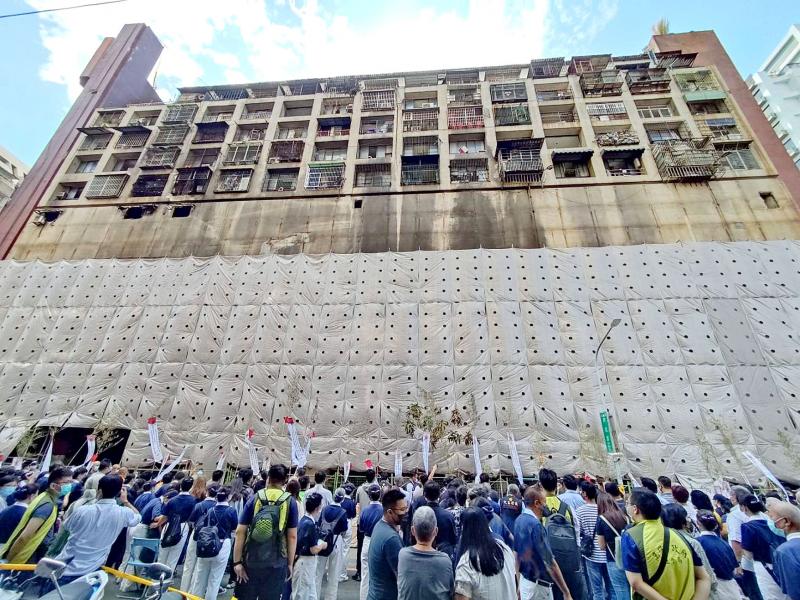President Tsai Ing-wen (蔡英文) yesterday pledged to reform the nation’s building regulations, two days after a fire in Kaohsiung killed 46 people.
The death toll from the fire at the 13-story Cheng Chung Cheng (城中城) building in the early hours of Thursday was the second-highest in Taiwan’s history, behind a February 1995 blaze at the Weierkang Club in Taichung that killed 64.
Speaking after visiting those injured in the fire at the 40-year-old Kaohsiung building, Tsai said that building safety regulations were lax, adding that she had instructed the Cabinet to propose plans to improve the safety of all properties while facilitating urban renewal plans.

Photo: Huang Chia-lin, Taipei Times
She said that government agencies should work with local authorities to reinforce fire safety inspections in older buildings, as well as ramp up efforts to facilitate government-led projects aimed at redeveloping older buildings and neighborhoods.
The most pressing issue is a thorough check of all mixed-use buildings in Taiwan, especially those partially abandoned and in a state of disrepair, and attending to problems within buildings that pose a public safety risk, she said.
The Urban Renewal Act (都市更新條例) states that the central or a local government can plan and implement a redevelopment project to renovate or reconstruct one or several buildings in a designated area.
However, in part due to complex property rights issues, projects involving older buildings often progress slowly.
On Friday, Minister of the Interior Hsu Kuo-yung (徐國勇) said that his ministry is considering amending the law to make it mandatory for all buildings to establish a management committee.
The ministry said that the committees are responsible for building repairs, maintenance and safety, as stipulated in the Condominium Administration Act (公寓大廈管理條例) promulgated in 1995.
However, the law does not apply to the 18,000 mixed-use buildings in the nation’s six special municipalities that were built before 1995, Hsu said.
Although local authorities have since encouraged the establishment of management committees in such buildings, 7,000 to 8,000 still do not have one, he added.
The ministry’s proposed amendment would mandate that all condominiums, regardless of whether they were constructed before 1995, must establish a management committee, Hsu said.
The proposed amendment would take into consideration that business sections of the building should contribute a portion of the management fee, he added.
Hsu also said that the proposed amendments would address loopholes such as buildings not being required to file public safety notices with the local government if the commercial section of the building is vacant, and buildings under 16 floors being exempt from filing public safety reports.

Taiwan has received more than US$70 million in royalties as of the end of last year from developing the F-16V jet as countries worldwide purchase or upgrade to this popular model, government and military officials said on Saturday. Taiwan funded the development of the F-16V jet and ended up the sole investor as other countries withdrew from the program. Now the F-16V is increasingly popular and countries must pay Taiwan a percentage in royalties when they purchase new F-16V aircraft or upgrade older F-16 models. The next five years are expected to be the peak for these royalties, with Taiwan potentially earning

STAY IN YOUR LANE: As the US and Israel attack Iran, the ministry has warned China not to overstep by including Taiwanese citizens in its evacuation orders The Ministry of Foreign Affairs (MOFA) yesterday rebuked a statement by China’s embassy in Israel that it would evacuate Taiwanese holders of Chinese travel documents from Israel amid the latter’s escalating conflict with Iran. Tensions have risen across the Middle East in the wake of US and Israeli airstrikes on Iran beginning Saturday. China subsequently issued an evacuation notice for its citizens. In a news release, the Chinese embassy in Israel said holders of “Taiwan compatriot permits (台胞證)” issued to Taiwanese nationals by Chinese authorities for travel to China — could register for evacuation to Egypt. In Taipei, the ministry yesterday said Taiwan

‘LIKE-MINDED PARTNER’: Tako van Popta said it would be inappropriate to delay signing the deal with Taiwan because of China, adding he would promote the issue Canadian senators have stressed Taiwan’s importance for international trade and expressed enthusiasm for ensuring the Taiwan-Canada trade cooperation framework agreement is implemented this year. Representative to Canada Harry Tseng (曾厚仁) in an interview with the Central News Agency (CNA) said he was increasingly uneasy about Ottawa’s delays in signing the agreement, especially as Ottawa has warmed toward Beijing. There are “no negotiations left. Not only [is it] initialed, we have three versions of the text ready: English, French and Mandarin,” Tseng said. “That tells you how close we are to the final signature.” Tseng said that he hoped Canadian Prime Minister Mark Carney

POSITIVE DEVELOPMENT: Japan and the US are expected to hold in-depth discussions on Taiwan-related issues during the meeting next month, Japanese sources said The holding of a Japan-US leaders’ meeting ahead of US President Donald Trump’s visit to China is positive news for Taiwan, former Japan-Taiwan Exchange Association representative Hiroyasu Izumi said yesterday. After the Liberal Democratic Party’s landslide victory in Japan’s House of Representatives election, Japanese Prime Minister Sanae Takaichi is scheduled to visit the US next month, where she is to meet with Trump ahead of the US president’s planned visit to China from March 31 to April 2 for a meeting with Chinese President Xi Jinping (習近平). Japan and the US are expected to hold in-depth discussions on Taiwan-related issues during the